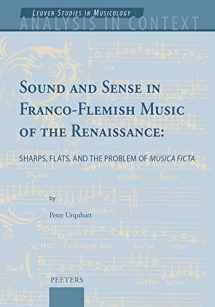
Sound and Sense in Franco-Flemish Music of the Renaissance: Sharps, Flats, and the Problem of Musica Ficta (Analysis in Context. Leuven Studies in Musicology, 7)
Book details
Summary
Description
Accidentals in Renaissance music have long been a problem for performers and editors, for they are often not fully prescribed in Franco-Flemish music. In the 20th century, a set of 'rules of musica ficta' were assembled to describe performers' practice in the 15th and 16th centuries, but the three primary rules contradict each other when applied to the repertory. The conflict forces one or more rules to be set aside in certain passages. Typically, modern editors sacrifice the linear rule in favor of harmonic aspects. The modern preference relies on a medieval concept-the exclusion of mi contra fa-which the author challenges. When the prohibition against mi contra fa is removed from singers' concerns, and understood as a rule aimed at composers-one they took delight in breaking at times-a proper balance between the three rules is regained, and an incisive and expanded harmonic world is revealed.


We would LOVE it if you could help us and other readers by reviewing the book
Book review



